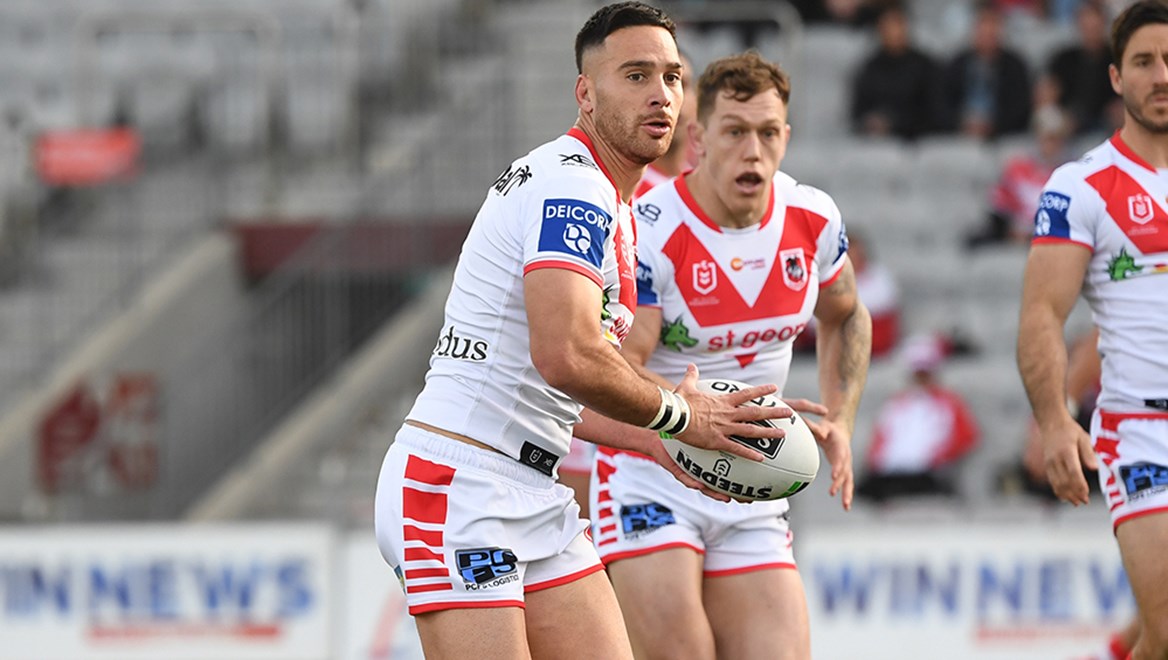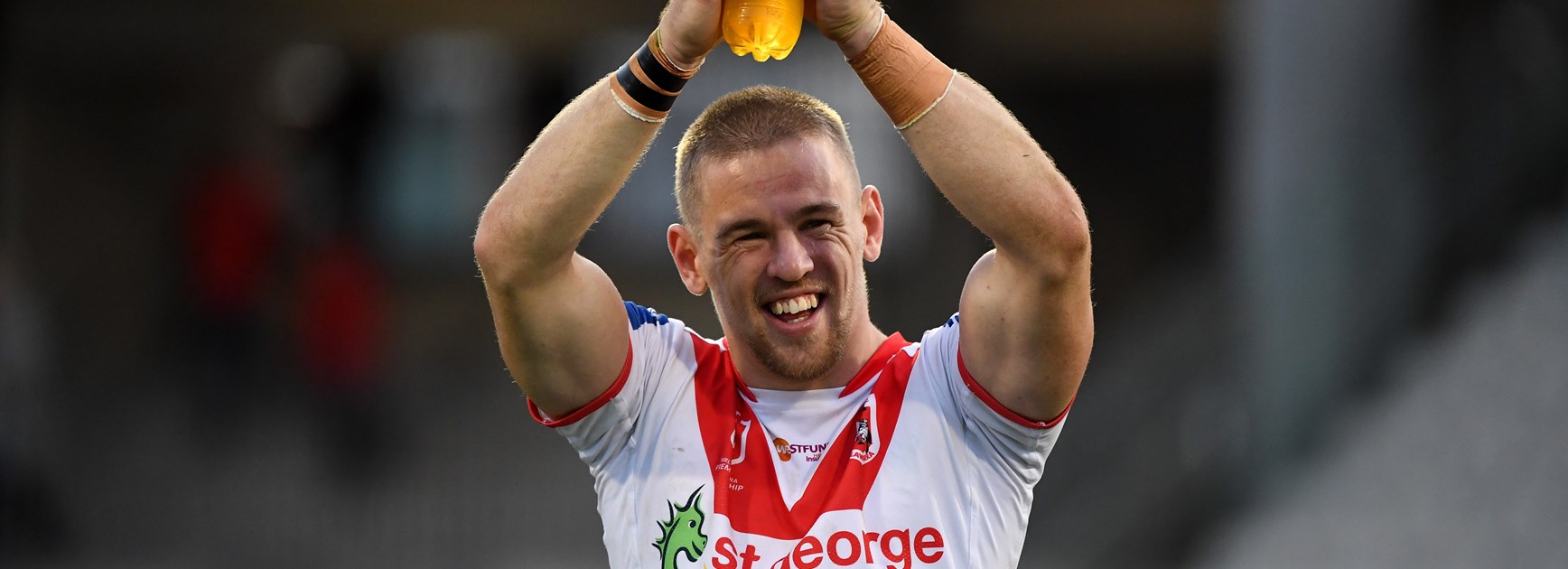July 27 2020 - 8:00PM
Kerr finding his voice through NRL journey
Dragons Den
Comments
PLATFORM: "Going through what I did growing up, I've realised the effect I can have on someone else if I do stand up and be proud." Dragons prop Josh Kerr. Picture: NRL Imagery
JOSH Kerr can't recall how young he was when he first got called a 'monkey', but he knows he was too young to understand why.
It was hurtful back then. These days, it makes the 24-year-old's blood boil, which is something to behold given how difficult it is to raise his hackles. Certainly as front-rowers go, Kerr's as un-confrontational as it gets.
Plenty have claims to the title, but the big Queenslander is probably
the nicest man in rugby league. It's just his nature.
It's why, as a kid, he'd find himself laughing along when subjected to casual racism by classmates. It was subtle, but it hurt even more than the overt slurs lobbed by strangers from the sidelines.
"Growing up [in Redcliffe] there weren't a whole lot of indigenous kids around, I grew up with mostly non-indigenous people," Kerr said.
"There were all these jokes about stealing and whatever else, I'm sure everyone's heard them. There were little jokes about indigenous people being drunk and on drugs, that we get free houses and cars from the government... things like that.
"There were only a handful of other indigenous people I knew around school so when they'd say those jokes I'd laugh along just to feel included. There was stigma I grew up with that hurt because myself and family weren't anything like that.
"I remember getting called a monkey from the sideline when I was young. I didn't really understand what it meant. It's one of those things, I look at it now in hindsight and I get riled up.
"I tried to deal with it by trying to make it look like it didn't affect me but it was in my head. Growing up and not really being proud of who I am, there was a point in time I felt ashamed because I felt everyone thought that about indigenous people."
Thankfully those earlier struggles were merely the first difficult steps on a much longer journey to the heights of the NRL.
While the young Josh Kerr found it difficult to speak up then, he's well and truly found his voice on his rise to elite rugby league - including two appearances for the Indigenous All-Stars.
"The person who stands out the most for me is Joel Thompson when I arrived at the Dragons, just how proud he was of our culture," Kerr said.
"He was the person who really made me stand up, stick my chest out and make me really proud of who I am. Going through what I did growing up, I've realised and the effect I can have on someone else if I do stand up and be proud.
"If I was stronger with my culture, and I knew what I know now when I was younger, I'd probably speak up a lot more. I'm so thankful to have the platform to do that now.
"An NRL player has a lot more cameras and microphones put in front of them. If I say something it's going to reach a wider spectrum of people than the regular person. That's the goal, to educate and tell a story about where we come from."
For Kerr, a proud Nughi Nunukul man of the Quandamooka Nation from Stradbroke Island, that education has been complex but rewarding, not just for himself, but for his family. It's something he naturally reflects on in weeks like the approaching NRL Indigenous Round.
"When my mother was born her indigenous mother, my Nanna Judy, had to give her up for adoption," Kerr said.
"Nanna Osborne, who adopted my mother, was literally an angel and still is. She kept in contact with Nanna Judy and when my mum was in her teens she introduced them.
"I don't go too far into because it's a personal story for them but I'm very lucky, my indigenous family is such a beautiful family of beautiful people that love their culture.
"Every time I get back home we try and book a trip over to North Stradbroke Island where my people are from, the Quandamooka Nughi Nunukul people. Learning about that culture, going back and seeing my nanna do all the rituals, all the Welcome to Country and speaking in our language is unreal.
"It's hard to describe how special and how powerful being that connected to culture is. I'm a lot prouder and more passionate about it because of the education I've received around that."
CALL IT OUT: After enduring racist slurs as a teenager, Indigenous All-Star Josh Kerr says he's now confident speaking up against racism. Picture: Anna Warr
There is, however, an uncomfortable flipside to education. No honest look at our country's history is complete without acknowledging the pain it holds for First Nations people.
One thing Kerr has certainly learned is that, just because indigenous athletes can find a platform through sport, it doesn't mean everyone will take kindly to what they have to say.
AFL great, and former Australian of the Year, Adam Goodes' sad departure from the game in 2015 amid hail of racist vitriol remains a stain in the country's sporting history.
In the NRL, the game's biggest indigenous stars like Latrell Mitchell, Cody Walker and Josh Addo-Carr have become constant targets for criticism since making a public stance against the national anthem.
Walker first went public with his views after the 2019 All-Stars clash, one shared by other indigenous players through the State of Origin series and into this year's meeting with the Maori All-Stars.
Last year Mitchell also went public about the racist abuse he's suffered at the hands of online trolls as a result. Kerr admits it can be disheartening, but he remains confident things are moving in the right direction.
"Latrell is a mate of mine, he's a brother of mine, and when I hear some of the things he's dealt with I just think... how can we take so many steps back?," he said.
"You wish it would just go away. The truth is it probably isn't going to for a long time but, from where it was to now, it's leaps and bounds ahead. Adam Goodes, Latrell Mitchell, these guys are proud and you see that they're proud.
"I've been called names and made a joke of and laughed along with people laughing at me to fit in. I look back on it now and think it was silly, stand up and be proud of who you are.
"I think people that did laugh back then were probably uncomfortable as well. If I'd said something then people might have stood with me. I think we are seeing that now."
The anthem stance, a position unanimously shared by the Indigenous squad ahead of this year's All-Stars clash, is a case in point.
Kerr and his teammates were not naive enough to think it wouldn't cause a stir, but it was price they were willing to pay to drive the national conversation forward.
"When we played the All-Stars game and didn't sing the anthem, I a hundred per cent knew some people were going to say we were racist, ungrateful and all the rest and they did," Kerr said.
"We didn't think it was all just going to go away after that but I knew at the point in time I was doing something to open peoples eyes and educate people as to why we were doing it.
"I think some people did get educated about the anthem and I think we are in better place now because there's a lot more people wanting to learn these things. Sometimes we just need to stop and listen and have that uncomfortable conversation.
"Not everyone's going to agree but you might change some people. That's the price I'm willing to pay so my children can hopefully live in a world free of racism. That might be wishful thinking, but as long as I'm doing my part to eradicate it, then I'm happy."
Most importantly, the message is now being heard at NRL HQ. In launching this year's round on Monday, ARLC chairman Peter V'landys said the 'Pass Back, Move Forward' theme will encourage people to have a more honest look at our country's history in order to move forward.
"This Round and this campaign reminds us all of the need for better awareness of Australia's history to ensure a fairer future for all," V'landys said.
"Thanks to Commissioner Megan Davis, I have spent time listening to a delegation of our Indigenous players. In fact, I was very disappointed with myself for not being aware of the difficulties and challenges they endured.








